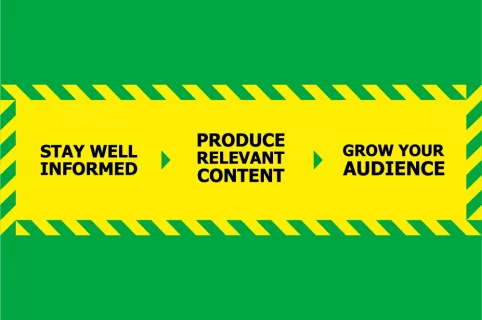
4 mins
OpenContent Marketing In The Time of COVID-19
4 mins
Lamenting how that Philosophy degree didn’t exactly make you more employable? You shouldn’t. Your humanities degree has taught you plenty of SEO fundamentals.
17th June 2015

Google founders Page and Brin drew on the concept of references conveying authority; and the cornerstones to Google’s potent ranking algorithm were laid.
The debate about the so-called “usefulness” of a humanities degree is ongoing. Whilst some have argued they’re a waste of your time, Universities like to describe the skills you learn during them as “transferable” on their prospectus.
It turns out they weren’t wrong. Grappling with Renaissance painting, post-modernist fiction or the mechanisms of the political economy may not have charted a clear course to a tangible vocation, but it’s probably made you excellent at a lot of things – like formulating insightful opinions and writing killer essays.
What you might not yet realise is that it’s also taught you a lot about SEO. Here’s how.
If at any point you started contemplating making a career of your field of study, you would have discovered that any hope of a future is hinged irrefutably on the recognition of your peers.
We don’t mean the kind of flimsy popularity that gets you a seat on the student council and has you maligned a few months later. In the world of academia, recognition is doled out in the form of references. There is no higher acclaim than having a peer refer to your research in their own work. That mention is a nod to your relevance and importantly, the scale of the contribution your research is making. That, is powerful currency.
When Google founders Larry Page and Sergey Brin were conceptualising a way to determine the relevance of online information, they drew on this concept and the cornerstones to Google’s potent ranking algorithm were laid.
Understand this one basic principle and you’re virtually half way to having wrapped your head around SEO. Except in the online world, references are the links you’re granted when others mention your website or the services it represents.
Most of your undergraduate degree was probably spent grappling with and then rehashing (no doubt in arresting prose) the existing body of research underpinning your discipline.
In postgraduate degrees the bar is raised considerably and you’d have been expected to start working towards producing insights that are unique. Why? Because academia is not about reinventing wheels. It wants to see how those wheels can be implemented to build impressive machines to get us new places.
Google feels much the same about the content you post online. If your blog post is merely a rehashed version of something already out there, it is unlikely to get much traction.
If your blog post is merely a rehashed version of something already out there, it is unlikely to get much traction.
If Google scowls at rehashed content, it lashes out furiously at plagiarism. Copy-pasting content does not just fail to add something uniquely valuable, it undermines the authenticity of the original work. Usually referred to as “duplicate content” in the online context, if your pages consist of copy that is repeated elsewhere online – be that on your site or another site, that page is highly unlikely to ever rank well.
Use those same online plagiarism checkers you were threatened with during your undergrad to see whether your site’s copy is truly unique. Then rejoice that your humanities degree has given you the ability to paraphrase and synthesise sources into something that no one has ever said in that exact way.
At some point during the wee hours of the morning, still facing a formidable stack of tediously verbose journal articles, we’ve all eventually had the same epiphany: you can cobble together a nearly decent research paper by strategically skimming your sources.
Because every academic article is written to a formula, you can get a very good sense of its content by relying almost exclusively on a hasty reading of the article’s abstract, subheadings, the first and last paragraphs of each section and the conclusion.
This principle translates quite well to how Google’s crawlers assign importance to content. Key information contained in headings and earlier on in articles are powerful indicators to Google of the overall focus of a piece of content. Combine this insight with your finely honed writing ability and your copywriting should already be quite SEO friendly.
Knowing how to wobble your way through a system of uncertainty will be extremely useful in the world of search engine optimisation.
Remember that enlightened, “I have a qualified opinion”-feeling you got whilst studying for your humanities degree? No? That’s probably because sometime during the second semester, knee-deep in books, journals and online resources, you would have come face to face with your own ignorance and have been discovering new depths to it since.
A humanities qualification will teach you how to skilfully slalom your way around a world coloured entirely in shades of grey. But there is one overarching lesson you’ll take away from these slopes: you will never be 100% right. Unlike the scientific vocations where practitioners are blessed with a great, unequivocal right or wrong: patient lives vs patient dies; bridge is sufficiently load bearing vs national infrastructure calamity.
A scholar of the humanities on the other hand must get used to being sometimes right, sometimes wrong, but mostly: “if viewed from a context of x, y justifies …”
Knowing how to wobble your way through a system of uncertainty will be extremely useful in the world of search engine optimisation. The world wide web may be founded on binary, on-off principles, but search is as grey as it gets.
Though it relies on highly sophisticated algorithms for its results, few people have a genuine insight into Google’s search mechanism. Most of what is known to the community of SEO agencies is inferred from observation. And even if we could know and understand fully how Google determines results, the results themselves are difficult to predict – always a function of the quality of other websites competing for the same space.
It is a system in flux, highly sensitive to context and evolving rapidly. Little could have prepared you for this industry better than that “useless humanities degree”.